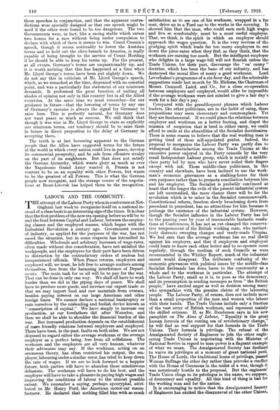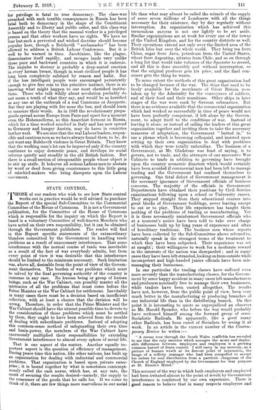LABOUR AND 171..e. COMMUNITY.
THE attempt of the Labour Party when in conference at Not- tingham last week to reorganize itself on a national in- stead of a ()lass basis is an interesting sign of the times. It is clear that the first problem of the new era pening before us will be to end the feud between Capital and Labour, between the employ- ing classes and the employed masses, which began with the Industrial Revolution a century ago. Government control of industry, as applied for the purposes of the war, has not eased the situation, but in some respects has intensified its difficulties. Wholesale and arbitrary increases of wage-rates, often made without due consideration, have not satisfied the workpeople, and the employers for their part have been driven to distraction by the contradictory orders of zealous but inexperienced officials. When Peace returns, employers and employed will; we trust, be left free to arrange matters among themselves, free from the harassing interference of Depart- ments. The main task for us all will be to pay for the war. That can be done in only one way. We shall all have to work harder than we did in the piping days of peace. We shall have to produce more goods, and increase our export trade so that we may import food and raw materials from oversee, besides paying interest on our large American and other foreign loans. We cannot declare a national bankruptcy or ruin ourselves by the misleading and foolish device known as " conscription of capital." We have simply to increase our production, as our forefathers did after Waterloo, and then we shall be able to shoulder the financial burden of the war. But increased production depends on the establishment of more friendly relations between employers and employed. There have been, in the past, faults on both sides. We are not disposed to regard either the average workman or the average employer as a perfect being, free from all selfishness. The workmen and the employers are all very human, whatever their advocates may say. If the workman, acting on an erroneous theory, has often restricted his output, the em- ployer, labouring under a similar error, has tried to keep down the rate of wages. If we are to look forward to a happier future, both parties will have to abandon these mischievous delusions. The workman will have to do his best, and the employer will have to take a pleasure in paying high wages and improving the oonditions of labour to the utmost possible extent. We remember a saying, perhaps apoo hai, attri- buted to Mr. Henry Ford, the American motor-oar manu- facturer. He declared . that nothing filled him with so much satisfaction as to see one of his workmen, wrapped in a fur coat, drive up in a Ford oar to the works in the morning. It showed him that the man, who could earn such high wages and live so comfortably, must be a most useful employee. That, we think, is the spirit in which an employer should approach thequestion. It is the very reverse -of the grudging spirit7vTi3ch leads far too many employeni to out down the piece-rates when they find, as they think, that the workmen are earning too much. But the intelligent employer who delights in a large wage-bill will not flourish unless the Trade Unions, for their part, discourage the " ea' canny " doctrine, which has been the bane of our industry, and has destroyed the moral fibre of many a good workman. Lord Leverhulme's programme of a six-hour day, and the admirable suggestions made last month by Mr. lichens, the Chairman of Messrs. Cammell, Laird, and Co., for a close co-operation between employers and employed, would alike be impossible if the average workman were not minded to give a fair day's work for a fair day's pay. Compared with the grandiloquent phrases which Labour leaders, like other politicians, are in the habit of using, these propositions may seem elementary and commonplace. Yet they are fundamental. If we could place the relations between employer and workman on a better footing, and dispel the miasma of suspicion that is bred in either camp, we could afford to smile at the absurdities of the Socialist doctrinaires. There is some reason to believe that the real working man is getting tired of these self-appointed guides. Indeed, the proposal to reorganize the Labour Party was partly due to widespread dissatisfaction among the Trade Unions at the excessive power enjoyed in the Party councils by the very small Independent Labour group, which is mainly a middle- class party led by men who have never soiled their fingers except with ink. These middle-class politicians, in this country and elsewhere, have been inclined to use the work- man's economic grievances as a stalking-horse for their own purposes rather than to promote conciliation between him and his employer. The Socialist is probably convinced at heart that the longer the evils of the present industrial system are left unremedied, the more chance there will be for the revolution which is to usher in the Socialist commonwealth. Constitutional reform, freedom slowly broadening down from precedent to precedent, has no attractions for him because it prolongs the existence of the industrial system. However, though the Socialist influence in the Labour Party has led to the passing year by year of innumerable fantastic resolu- tions at Conferences, it has not as yet changed the conserva- tive temperament of the British working man, who instinct- ively distrusts sweeping changes and ready-made Utopias. We feel sure that the average workman. has no real illwill against his employer, and that if employers and employed could learn to know each other better and to co-operate more regularly, through the medium of such Councils as were recommended in the Whitley Report, much of the industrial unrest would disappear. The deliberate confusing of the economic grievances with political issues by the middle-class Socialist firebrands has done harm to the community as a whole and to the workman in particular. The attempt of the Labour Party, small as it is, to pose as the democracy, and its presumption in sending messages as from " the British people," have excited anger as well as derision among many who sympathize with the genuine claims of the labouring people. The Labour Party, of course, does not include more than a small proportion of the men and women who labour with their hands. The Trade Unions include only a fraction of the vast army of British workmen, and represent mainly the skilled artisans. If, as Mr. Henderson says in his new pamphlet on The Aims of Labour, " Equality Is the great human formula of the coming era of revolutionary change," he will find no real' support for that formula in the Trade Unions. Their formula is privilege. The refusal of the Amalgamated Society of Engineers to join the other engin- eering Trade Unions in negotiating with the Minister of National Service in regard to man-power is a flagrant example of what we mean. The Amalgamated Society has declined to waive its privileges at a moment of great national peril. The House of Lords, the traditional home of privilege, passed Woman Suffrage the other day rather than provoke a conflict with the House of Commons in the midst of a war, though it, was notoriously hostile to the proposal. But the engineers' Trade Union clings to its privileges in the name, we suppose, of democraoy and equality. All this kind of thing is bad for the working man and for the nation. It is encouraging to notice that the Amalgamated Society of Engineers has excited the disapproval of the other Unions, for privilege is fatal to true democracy. The class-war preached with such terrible consequences in Russia has been fatal both to democracy in the shape of the Constituent Assembly and to liberty and public order, and this class-war is based on the theory that the manual worker is a privileged person and that other workers have no rights. We have no fear lest such a perverted and wicked doctrine should become popular here, though a Bolshevik " ambassador " has been allowed to address a British Labour Conference. But it is well to be warned in time. Jacobinism, like the plague, disseminates itself rapidly, and ravages lands very unlike those poor and backward countries in which it is endemic. The impulse to destroy is probably a deep-seated emotion in every human breast, though in most civilized people it has long been completely subdued by reason and habit. But if the less intelligent people were encouraged persistently enough to give free rein to this primitive instinct, there is no knowing what might happen to our most cherished institu- tions. Those who talk wildly about revolution probably do not mean a tenth of what they say, and would be as horrified as any one at the outbreak of a real Commune or Jacquerie. But they are playing with fire none the less, and should learn to measure their words. As in 1848 the revolutionary propa- ganda spread across Europe from Paris and upset for a moment even the ilohenzollerns, so this Anarchist ferment in Russia, which for a time worked mischief in Italy and has now spread to Germany and hungry Austria, may do harm in countries further west. We are sure that the real Labour leaders, respon- sible and cautious men as we have always found them to be, do not want any Bolshevik violence in Great Britain. They know that the working man's lot can be improved only if the country continues to enjoy domestic peace, and develops its social reforms quietly and steadily in the old British fashion. But there is a small section of irresponsible people whose object is to stir up strife. It behoves all serious Labour men to abstain by word or deed from giving countenance to this little gang of mischief-makers who bring disrepute upon the Labour movement.



































 Previous page
Previous page